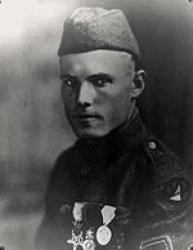
 |
|
|
||
|
Charles Denver Barger |
||||
|
Engagements: • World War I (1914 - 1918) |
||||
| Biography: | ||||
|
Charles Denver Barger Private First Class, U.S. Army Medal of Honor Recipient World War I
Private First Class Charles Denver Barger (03 June 1892 - 25 November 1936) was a U.S. Army soldier who received the U.S. military's highest award for valor, the Medal of Honor, for his heroic actions during World War I. Charles Denver Barger was born in Mount Vernon, MO, in 1892 and grew up in nearby Stotts City. After his father died when he was six, his mother turned him over to an orphanage. He was adopted and did not see his mother again until after World War I. Barger joined the Army from Stotts City. On 31 October 1918, he was a Private First Class serving as a stretcher bearer in Company L of the 354th Infantry Regiment, 89th Division. Near Bois-de-Bantheville, France, that day, Barger's division sent several patrols into 'no man's land' to reconnoiter German positions in preparation for an advance as part of the Meuse-Argonne Offensive. Unusually, the patrols had been sent out during daylight, rather than waiting for the cover of darkness. Two patrols from Barger's regiment became pinned down by heavy rifle and machine gun fire. Second Lieutenant John M. Millis was seriously wounded in the legs and ordered his men to leave without him. One man managed to crawl to the safety of the Allied lines and brought news that Millis and another wounded officer were trapped in no man's land. Upon hearing this, Barger and another stretcher bearer, Private First Class Jesse N. Funk, voluntarily ran 500 yards through heavy machine gun fire with their stretcher and rescued Millis. They then returned and rescued the other officer, First Lieutenant Ernest G. Rowell. For these actions, both Barger and Funk were awarded the Medal of Honor the following year. These were the only Medals of Honor received by Army medical personnel in World War I. Medal of Honor Rank and organization: Private First Class, U.S. Army, Company L, 354th Infantry, 89th Division. Place and date: Near Bois-deBantheville, France, 31 October 1918. Citation: Learning that 2 daylight patrols had been caught out in No Man's Land and were unable to return, Pfc. Barger and another stretcher bearer upon their own initiative made 2 trips 500 yards beyond our lines, under constant machinegun fire, and rescued 2 wounded officers. After the war, Barger returned to the United States and left the military, having served only one year. Post-War Life Barger married Ruth Bailey and had three children: Charles D. Barger, Jr., born in 1923; Joseph Elmer Barger, born in 1924; and "Dodi" Mable Louise Barger, born in 1927. He had difficulty adjusting to civilian life and struggled to stay employed. He was a member of the American Legion, and fellow veterans from that group helped him find work until "the general public and those who could give employment to veterans became apathetic to the appeals for help on the ground[s] that he was a national hero." He worked on his adoptive uncle's farm near Stotts City in 1920, as a construction worker in Waco, MO, the next year, and then as a Kansas City police officer. He remained with the police force for twelve years before moving to a farm four miles southwest of Oak Grove, outside of Kansas City. Medals and Awards Medal of Honor Death and Burial On the night of 23 November 1936, county police were called to Barger's home, where they found him wielding a large hunting knife and setting fire to his farmhouse. He had three self-inflicted wounds to his throat, and the deputies reported that "his clothing was torn and his body burned in a dozen places." When the officers attempted to arrest him for threatening to kill his wife, he lunged at them with the knife. Deputy Frank Ridenour fired in self-defense, seriously wounding Barger. He was taken to the Kansas City General Hospital and died two days later. He was buried at Blue Springs Cemetery in Blue Springs, MO, not far from his Oak Grove home. |
||||
| Honoree ID: 1735 | Created by: MHOH | |||
Ribbons
Medals
Badges
Honoree Photos
 |  |  |
 |  |
 |


